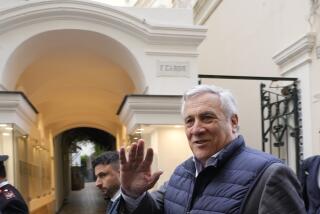Obama challenges Iran to address nuclear issues in new talks
Saying new negotiations with Iran will provide “a pretty good sense fairly quickly” of whether a diplomatic solution can prevent war, President Obama challenged Tehran to end the mounting crisis with the West over its disputed nuclear program.
Obama spoke shortly after the United States, China, Russia and key European allies said they were prepared to accept an offer in a letter from a senior Iranian official expressing Tehran’s readiness to reopen negotiations that broke down in January 2011.
The president on Tuesday also sharply chastised his Republican rivals and others who he said are “popping off” with “a lot of bluster and a lot of big talk” about launching a military attack on Iran’s nuclear facilities.
“Those who are suggesting or proposing or beating the drums of war should explain clearly to the American people what they think the costs and benefits would be,” Obama said at his news conference. “I am not one of those people.”
The resumption of talks, which was announced in London, gives Iran an opportunity to emerge from deepening isolation and economic upheaval and will serve as a test of Obama’s contention that a strategy of ever-tightening economic sanctions and diplomatic overtures can produce a peaceful solution.
The European Union’s foreign minister, Catherine Ashton, wrote in a letter to Saeed Jalili, secretary of Iran’s Supreme National Security Council, that a date and venue for the talks should be decided “as soon as possible.”
Iran on Tuesday said it would grant inspectors from the International Atomic Energy Agency, the United Nations’ nuclear watchdog group, long-sought permission to visit its Parchin compound, which it has described as a military base, not a nuclear facility.
Tehran says it wants to produce nuclear energy for civilian purposes only, but Western governments worry that the Islamic Republic is enriching uranium to develop nuclear weapons. The United States and European Union have imposed crippling sanctions on Iran’s oil exports, banking sector and other parts of its economy, and more punishments will take effect in coming months.
Obama spoke to reporters a day after he pressed Israel’s visiting prime minister, Benjamin Netanyahu, to delay any military strikes on Iran at least long enough to see whether diplomacy and sanctions can work. Israeli officials, concerned that Iran would attack if it developed a nuclear weapon, believe a preemptive raid is justified if Tehran approaches the capability of building bombs or moves enough of its uranium enrichment underground to make it less vulnerable to an attack.
In his news conference, Obama acknowledged that Iranian officials engaged in “hemming and hawing and stalling and avoiding the issues” in talks over the last nine years. But he said the latest sanctions have dealt a blow to Iran’s economy, and as a result, Iran’s leaders “understand that the world community means business.”
Obama said Iranian officials must “discuss in a clear and forthright way” how to prove that they are abiding by the Nuclear Nonproliferation Treaty and are not secretly pursuing a nuclear weapon. “They know how to do that. This is not a mystery.”
The president said he does not expect a sudden breakthrough, but he indicated a possible time frame for determining whether other options, including a military attack, may be necessary. “This notion that somehow we have a choice to make in the next week or two weeks or month or two months is not borne out by the facts,” he said.
European officials said they will begin preliminary discussions in the next two weeks to try to arrange talks that may begin in early April, in a yet-to- be-determined “neutral” city.
Western leaders fear Iran will try to use the talks to buy time, and they will seek to determine as soon as possible whether Tehran is serious about negotiations. One European diplomat said the threat of an Israeli military action is building pressure in the West for quick progress.
Ray Takeyh, a former Obama administration advisor on Iran, said the West has been eager to restart the talks, although the six nations involved spent several weeks in discussions before accepting the Iranian offer.
He said that although Iran is clearly “more isolated, more pressured, more economically distressed” than before any previous round of talks, predicting what course its leaders will take remains difficult.
Obama, speaking Tuesday of certain Republican foes, derided “the casualness with which some of these folks” talk about starting another war. “This is not a game and there’s nothing casual about it,” he said.
Talk of war swelled further in Washington as three of the Republican presidential candidates addressed the nation’s largest pro-Israel lobby via satellite TV. Each accused Obama of failing to move forcefully on Iran and offering insufficient support to Israel.
“Hope is not a foreign policy,” Mitt Romney said. “The only thing respected by thugs and tyrants is our resolve, backed by our power and our readiness to use it.”
Romney said he would be ready to engage in diplomacy. “But I will be just as ready to engage our military might,” he said.
Rick Santorum derided negotiations with Iran as “another appeasement, another delay, another opportunity for them to go forward while we talk.”
Newt Gingrich promised that if he wins the White House, “we would not keep talking while the Iranians keep building.” He added, “We would indicate clearly that their failure to stop their program is in fact crossing a red line.”
Richter reported from Washington and Chu from London.
More to Read
Start your day right
Sign up for Essential California for news, features and recommendations from the L.A. Times and beyond in your inbox six days a week.
You may occasionally receive promotional content from the Los Angeles Times.








